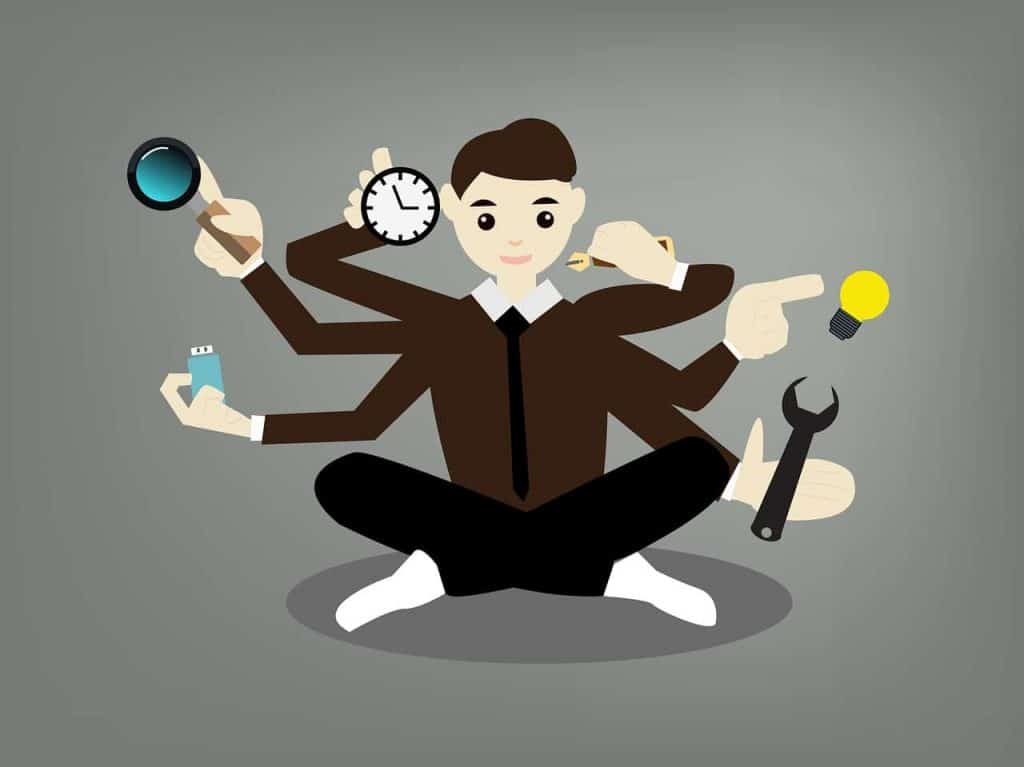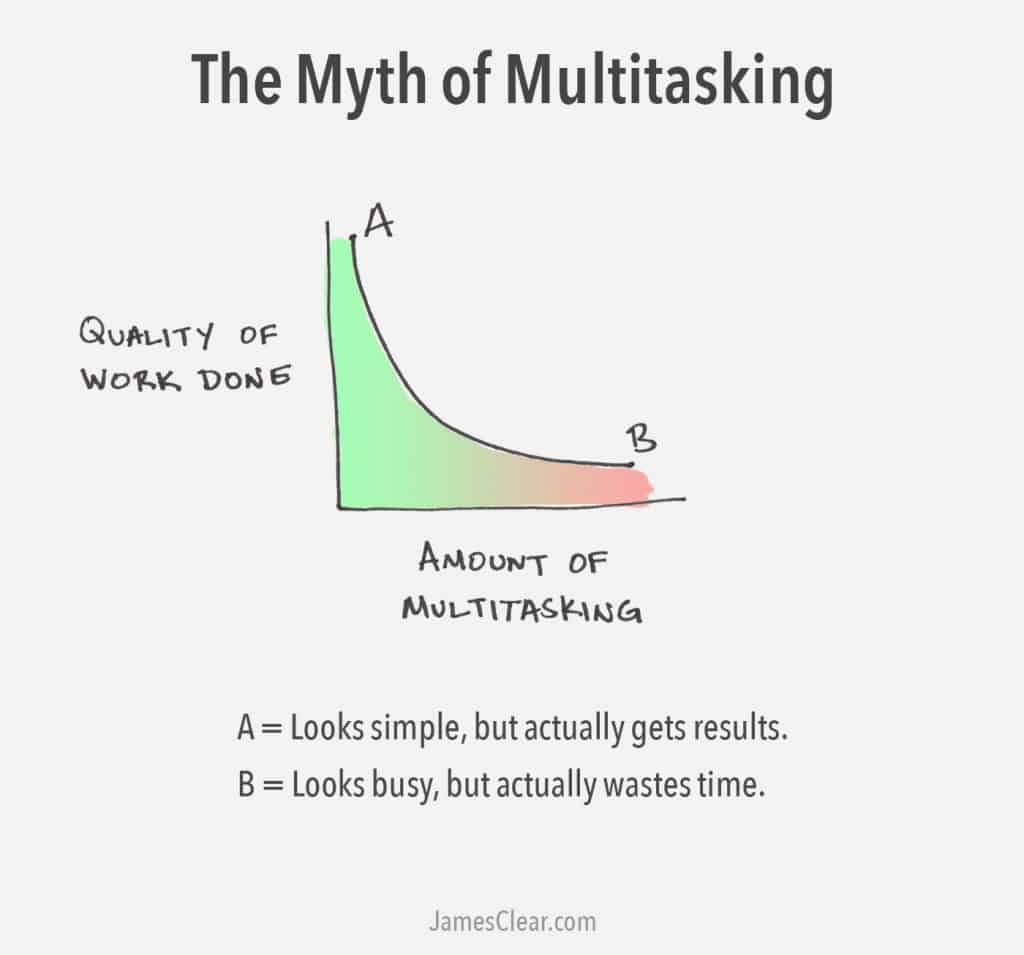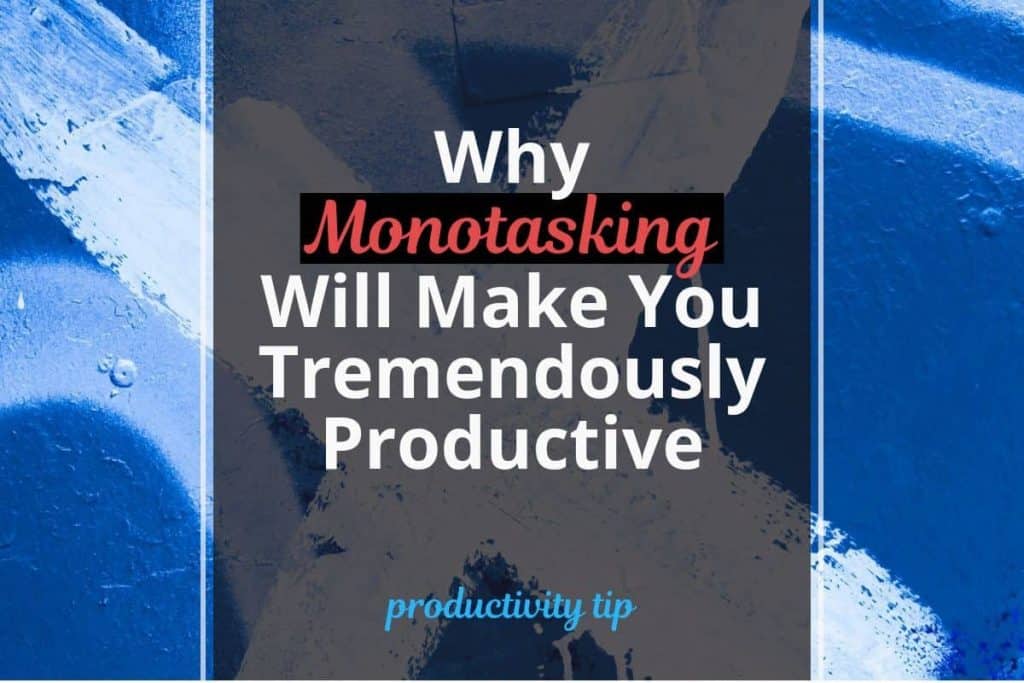🖊 This article was last updated on December 21, 2019
The most important productivity tip I want to share is about focusing on one task and one task only. While we often feel proud of our ability to multitask, it’s actually detrimental to our productivity. Research has shown over and over again that multitasking not only hurts our productivity (a lot!) but also that we can’t even do it! What we think of as multitasking is actually switch-tasking, where we rapidly switch between multiple tasks.
Little side note here: the statement above is 98% correct. About 2% of us behave, for a yet unknown reason, differently in regards to multitasking. These people are called supertaskers. The funny thing? If you think you’re one of them, you’re probably not. Research has shown that the 98% of us that are bad at multitasking tend to overestimate our ability to do so. And ironically, the 2% of supertaskers, tend to downplay their ability to multitask. So going forward, I think it’s a pretty good bet to say you and I suck at multi-tasking (and switch-tasking). Want to prove me wrong (and probably waste 40 minutes)? Here’s an online test you can do.

We like to think we can do two things at a time and it makes us FEEL productive. But there is an overwhelming pile of evidence that multitasking is simply not something our brain can do. We TRY to do multiple things at once, but what our brain actually does is constantly switching from one thing to another back and forth. Our brain can only do one thing at a time.
Yes, also for women
It’s a long-standing stereotype (or Old wives’ tale?) that women are better than men in multitasking. Is it true? The answer is an unsatisfying “yes, but it doesn’t matter”. There has actually been done surprisingly little research on this topic in the past. There is hardly any empirical evidence that women are better at multitasking than men, but there is research that shows that women are typically more involved in multitasking than men. Still, the question whether men or women were better in multitasking remained.
Recently there have been more attempts to find an answer to this question, which proved to be more difficult than one would expect. While a Chinese study confirmed the stereotype in 2009, another study in Sweden concluded exactly the opposite (but only in the luteal phase of the menstrual cycle). A 2013 experiment set out to settle the debate once and for all. In the monotasking part of the test, both women and men performed equally. In the multitasking part of the test, part of there results were as one would expect:
Both women and men slowed down, and made more mistakes, as the switching became more rapid.
There was a gender difference though: while men took on average 77% longer to perform the tasks, women “only” took 69% longer.
So the conclusion of the age-old debate seems to be: For both genders, monotasking is faster and yields better results than multitasking. We’re all bad at multitasking, but women are a little bit “less bad” at it than men.
The CPU downgrade
If this information feels like downgrading from a shiny high-end multi-core computer processor to a single-core, CPU you’d better sit down because it get’s even worse…
Not only can we only do one thing at a time, switching between tasks actually slows us down. Researchers have found that we use “goal shifting” to decide to do one thing instead of another, and “role activation” to change the rules for the previous task to the rules of the new task. And you know what these fancy terms do? They hurt our productivity. According to experts, switch-tasking can cost as much as 37% of our productive time. Other studies show that it takes an average of 23 minutes to get back to a task after being interrupted.

source: jamesclear.com
So what does this mean? It means that if we think we are multitasking (when we are actually switch-tasking) we’re not only unproductive, we’re even doing a lousy job at those tasks because we can’t fully concentrate on them AND we get extra tired in the process.
A Stanford University Psychology Professor and expert on the effects of multitasking said this in an interview:
“The research is almost unanimous, which is very rare in social science, and it says that people who chronically multitask show an enormous range of deficits.”
So now that we know we’re dealing with a monotasking Pentium III CPU instead of a fancy 72 multi-core processor, it’s time to rethink the way we operate.
The solution? Monotasking!
Monotasking, also called singletasking, is exactly what it sounds: doing one thing and doing it well before moving to the next thing, instead of doing many things not so well and getting tired in the process.

Now, depending on your personality, monotasking may be harder than it sounds and it may take some time to get used to this. While we all have a “monkey mind”, some of us (like me) have a natural tendency to be all over the place. It requires both the knowledge (which you have now) and a state of awareness (mindfulness practice can also help with this) to remember to monotask and focus on one task and one task only.
But if you see how much of a productivity boost it can give us, I think it’s well worth the effort to at least try to minimize multitasking as much as we can.
3 tips to get better at monotasking
- For me, and most likely for you too, my smartphone is a huge distraction. When my phone is in sight at my desk or on the table while having dinner, it pulls my focus and attention towards it. I purposefully keep my phone in my pocket, out of sight or even in another room when I want to have a focused and meaningful conversation, or just enjoy dinner with my girlfriend.
- I only
checkprocess email when I have time to respond to it also. Because of the dopamine hit we get every time we “check” our emails, it’s easy to become addicted to it (it’s similar to a slot machine). By only processing email when I’ve got the time to process and/or respond to any incoming emails, I get a lot more done and I keep control over my own schedule. On busy days I have 3 time slots scheduled for processing emails - Take short breaks between periods of monotasking. Your brain needs to have the downtime now and again to let your thoughts wander. A cup of tea or a short walk do wonders to recharge!
Curious which productivity tip I’ll share next week? Subscribe below and you’ll be the first to know!
- These Black Friday deals will skyrocket your productivity (2021 edition) - November 11, 2021
- How to Stay Productive as a Digital Nomad - December 23, 2019
- When is the right time to outsource? - December 3, 2019


Nice Article bro!